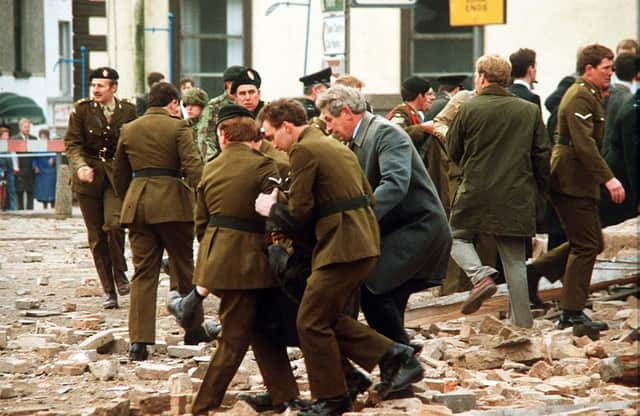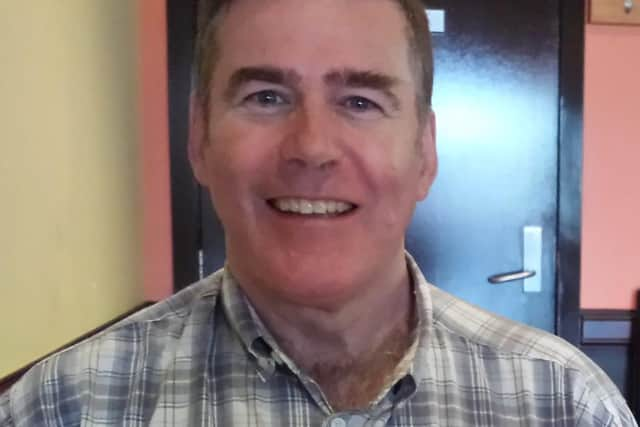Karl McElhinney: I had often experienced death, but Remembrance Day bomb was chilling


Things had been busy enough, after the usual fashion. I was thinking to myself that I would, the next day, call my elder brother Paul, who would turn 30 on the Sunday.
At around 10.30pm that night, I was called to a pub in Lisnaskea, where a man was suffering some chest pain.
Advertisement
Hide AdAdvertisement
Hide AdThe nurse and I drove out in the cardiac ambulance and brought the patient back to the hospital.


Things quietened down after the patient settled in the coronary care unit.
On Sunday morning, I did my rounds of the patients before the consultant, Dr John Williams, came to do the formal ward round.
A friend of mine, one of the student nurses, was having difficulty with the metal cot-side of the bed of one of the patients so I assisted her.
Advertisement
Hide AdAdvertisement
Hide AdAt the moment when I managed, with some clanging, to set the piece in its correct position, I thought I heard what could be described as a 'whoomp'.
Michelle, the nurse, looked up and said, “that was a bomb”.
Indeed it was. I looked over my shoulder and out the window to see a light grey plume of smoke rising from somewhere in the town.
The Erne was situated on a height, across the river from the town. The time was about 11.45am.
I proceeded downstairs to ‘casualty’, which is what we called the small emergency department.
Advertisement
Hide AdAdvertisement
Hide AdFrom that time until about 7pm, the time passed without my noticing it.
I never made the phone call to my brother; I don't know whether the ward round took place.
An event had been arranged to mark Remembrance Day, in honour of those who had fought in the world wars.
In the vicinity of the cenotaph in the town civilian members of the public had gathered, as well as members of the security forces.
Advertisement
Hide AdAdvertisement
Hide AdWhat seemed to be a very short period of time after the explosion, the injured were brought by ambulance to the hospital. I remember the names of some of those to whom I attended.
As I mentioned, time flew past. At some point, I was walking from the casualty theatre to another room, when a porter asked me to come outside, where two ambulances had brought in those who had been killed by the bomb outright.
There were 10 people whom I pronounced deceased.
I recall saying something distinctly odd. The nature of the injuries of one of the deceased prompted me to say, “this is incompatible with life”.
My stating the obvious was quite bizarre, but I recall feeling that I should put things into a starkly real context. I had often experienced death; but this was chilling.
Advertisement
Hide AdAdvertisement
Hide AdThe range of injuries sustained by the victims was quite extensive. At one point, I was attending to a little boy who had a laceration. I won't mention his name, although I believe I recall it.
Beside me stood his father, who was a member of the RUC. The father was, most understandably, very upset about the episode.
He mentioned that it was awful how the perpetrators had had no regard for the people affected by the explosion. He cited the example of the elderly and the children.
I was feeling rather disturbed, too. I held my tongue. I speak with a rather odd accent which is certainly not indigenous to that part of the country.
Advertisement
Hide AdAdvertisement
Hide AdI felt that, under the fraught circumstances, any comment of mine might cause awkwardness.
The staff nurse assisting me, still in her Sunday clothes, passed a remark: calming and apposite. There was no need for me to speak.
To this day, I don't know whether this nurse – who was a very able member of staff – had been at church or at the remembrance ceremony.
Later in the day, when things were not quite as hectic, a most delightful young woman – she would have been about 20 – arrived with her mother.
Advertisement
Hide AdAdvertisement
Hide AdThey had postponed their attendance in favour of other injured people. I injected some local anaesthetic in order to be able to enlarge the wound, thus enabling better exploration.
The shard of glass within was larger than would be expected by the size of the laceration. Afterwards, I sutured the wound.
I found their forbearance, which I regarded as a most uplifting example of Christian conduct, to be exceptional, and I expressed my gratitude to both mother and daughter when they were leaving.
They were both warm and dignified. I can tell you that I found myself exceedingly blessed to have met them both.
Advertisement
Hide AdAdvertisement
Hide AdThis brief encounter was thoroughly heartening, especially as it followed a day of ugliness and tragedy. I believe that God's influence can be observed even when evil hovers nearby.
It had passed 7pm, and I went to the canteen. There was no more 'proper' food, and I bought a bar of chocolate. Eating was not really important, and one had no appetite anyway.
One victim died in the operating theatre; one man died some years later. In total,12 people died as a result of that bomb.
The following morning, a detective came to see me on the ward. I signed a statement in connection with those people whose deaths I had certified the day before.
Advertisement
Hide AdAdvertisement
Hide AdI remember his name. I expressed my dismay – it all hit me just then – that anyone could seek to justify such an atrocity. He opined that police officers appreciate that they might be killed in the line of duty.
I countered that I believed that the killing of anyone is wrong.
The atmosphere in the hospital remained somewhat tense for a few weeks, as I recall.
The experience remains salient; and that is for those of us who were merely assisting in the aftermath.
Advertisement
Hide AdAdvertisement
Hide AdKarl McElhinney is an Irish doctor now practising as a a GP in Hamilton, New Zealand. He is a graduate of the Royal College of Surgeons in Ireland and worked as a junior doctor in the Erne Hospital, Enniskillen in the late 1980s. His job at the Erne was his very first as a practising doctor.